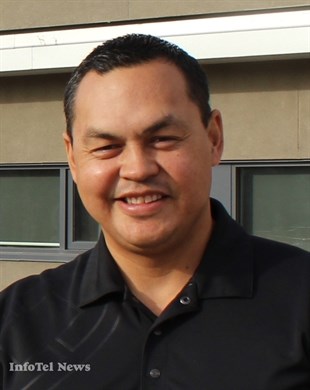
Penticton Indian Band Chief Jonathan Kruger.
(SHANNON QUESNEL / iNFOnews.ca)
August 26, 2014 - 5:00 AM
PENTICTON - The Chief of a local First Nations band says he wants to see more respect throughout the province and the country for the roles band chiefs and councillors play.
New federal laws requiring First Nations to release audited financial statements publicly has brought numerous comparisons between First Nations chiefs and councillors to city mayors and councillors. Penticton Indian Band Chief Jonathan Kruger welcomes the transparency but says context is missing.
Kruger earns roughly $60,000 a year and has a travel budget set aside for all the meetings he attends with various first nations groups and alliances. His salary comes from the band's taxes, and is considered an ‘honorarium,’ which means he cannot collect employment insurance or pension once he leaves his position, even though he pays into both those funds.
A First Nations chief is more equivalent to that of a provincial minister, who does collect pension and earns a higher salary. Kruger said he would like to see chiefs and ministers paid equally, starting with a base rate salary.
Kruger travels throughout the province frequently for business and politics and quarterly meetings with Aboriginal Affairs he attends. And it has paid off. In his five and a half years as Chief, Kruger has brought in $31 million in community capital for infrastructure for the PIB, and this doesn’t include the recently approved bridge over the Penticton channel.
“Our role is difficult and we need to be respected,” Kruger said.
His is one of seven bands that make up the Okanagan Nation Alliance, which once extended into Washington state. The Nation is like a country, and the bands are like the provinces, he explained. There is no equivalent to a municipality under first nations governance.
Bands do have an elected council, however, the members of which are advisors for the chief who oversees business and community matters, and is ultimately the one held accountable for the band’s actions, he said.
The provincial and first nation’s governments need to work together and have a healthy relationship if things are going to move forward, Kruger said. Otherwise things will be at a standstill.
The province wants to use reservation lands (not just in Penticton) for mining and forestry, for example, which Kruger said he doesn’t have a problem with, so long as the ministries remain responsible and respectful.
And they have been, he said, giving the example of the Ministry of Forestry logging on the PIB lands. The band will tell the ministry to stay clear of sacred lands, patches of huckleberries where deer birth their fawns.
“The Okanagan people are a strong people. We are coming back,” he said, referring to years of polarization the first nations have dealt with from the federal and provincial governments.
“If you took 150 years of language and culture from our people, you can put 150 years back,” Kruger said.
To contact the reporter for this story, email Meaghan Archer at marcher@infotelnews.ca or call 250-488-3065. To contact the editor, email mjones@infotelnews.ca or call 250-718-2724.
News from © iNFOnews, 2014